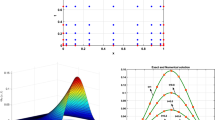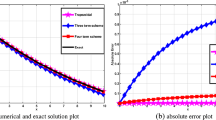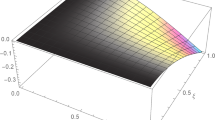Abstract
We investigate strong stability preserving (SSP) general linear methods (GLMs) for systems of ordinary differential equations. Such methods are obtained by the solution of the minimization problems with nonlinear inequality constrains, corresponding to the SSP property of these methods, and equality constrains, corresponding to order and stage order conditions. These minimization problems were solved by the sequential quadratic programming algorithm implemented in MATLAB\(^{\circledR }\) subroutine fmincon.m starting with many random guesses. Examples of transformed SSP GLMs of order \(p = 1, 2, 3\), and 4, and stage order \(q = p\) have been determined, and suitable starting and finishing procedures have been constructed. The numerical experiments performed on a set of test problems have shown that transformed SSP GLMs constructed in this paper are more accurate than transformed SSP DIMSIMs and SSP Runge–Kutta methods of the same order.


















Similar content being viewed by others
References
Butcher, J.C.: Diagonally-implicit multi-stage integration methods. Appl. Numer. Math. 11, 347–363 (1993)
Butcher, J.C., Jackiewicz, Z.: Construction of general linear methods with Runge–Kutta stability properties. Numer. Algorithms 36, 53–72 (2004)
Butcher, J.C., Wright, W.M.: The construction of practical general linear methods. BIT 43, 695–721 (2003)
Califano, G., Izzo, G., Jackiewicz, Z.: Starting procedures for general linear methods. Appl. Numer. Math. 120, 165–175 (2017)
Constantinescu, E.M., Sandu, A.: Optimal explicit strong-stability-preserving general linear methods. SIAM J. Sci. Comput. 32, 3130–3150 (2010)
Ferracina, L., Spijker, M.N.: An extension and analysis of the Shu–Osher representation of Runge–Kutta methods. Math. Comput. 74, 201–219 (2004)
Ferracina, L., Spijker, M.N.: Stepsize restrictions for the total-variation-diminishing property in general Runge–Kutta methods. SIAM J. Numer. Anal. 42, 1073–1093 (2004)
Ferracina, L., Spijker, M.N.: Stepsize restrictions for the total-variation-boundedness in general Runge–Kutta procedures. Appl. Numer. Math. 53, 265–279 (2005)
Ferracina, L., Spijker, M.N.: Strong stability of singly-diagonally-implicit Runge–Kutta methods. Appl. Numer. Math. 58, 1675–1686 (2008)
Gottlieb, S.: On high order strong stability preserving Runge–Kutta methods and multistep time discretizations. J. Sci. Comput. 25, 105–127 (2005)
Gottlieb, S., Ketcheson, D.I., Shu, C.-W.: High order strong stability preserving time discretizations. J. Sci. Comput. 38, 251–289 (2009)
Gottlieb, S., Ketcheson, D.I., Shu, C.-W.: Strong Stability Preserving Runge–Kutta and Multistep Time Discretizations. World Scientific Publishing Co. Pte. Ltd., Hackensack (2011)
Gottlieb, S., Ruuth, S.J.: Optimal strong-stability-preserving time stepping schemes with fast downwind spatial discretizations. J. Sci. Comput. 27, 289–303 (2006)
Gottlieb, S., Shu, C.-W., Tadmor, E.: Strong stability-preserving high-order time discretization methods. SIAM Rev. 43, 89–112 (2001)
Higueras, I.: On strong stability preserving time discretization methods. J. Sci. Comput. 21, 193–223 (2004)
Higueras, I.: Monotonicity for Runge–Kutta methods: inner product norms. J. Sci. Comput. 24, 97–117 (2005)
Higueras, I.: Representations of Runge–Kutta methods and strong stability preserving methods. SIAM J. Numer. Anal. 43, 924–948 (2005)
Hundsdorfer, W., Ruuth, S.J.: On monotonicity and boundedness properties of linear multistep methods. Math. Comput. 75, 655–672 (2005)
Hundsdorfer, W., Ruuth, S.J., Spiteri, R.J.: Monotonicity-preserving linear multistep methods. SIAM J. Numer. Anal. 41, 605–623 (2003)
Hundsdorfer, W., Verwer, J.G.: Numerical Solution of Time-Dependent Advection–Diffusion–Reaction Equations. Springer, Berlin (2003)
Izzo, G., Jackiewicz, Z.: Strong stability preserving general linear methods. J. Sci. Comput. 65, 271–298 (2015)
Izzo, G., Jackiewicz, Z.: Strong stability preserving multistage integration methods. Math. Model. Anal. 20, 552–577 (2015)
Izzo, G., Jackiewicz, Z.: Strong stability preserving transformed DIMSIMs. J. Comput. Appl. Math. (submitted)
Jackiewicz, Z.: Implementation of DIMSIMs for stiff differential systems. Appl. Numer. Math. 42, 251–267 (2002)
Jackiewicz, Z.: General Linear Methods for Ordinary Differential Equations. Wiley, Hoboken (2009)
Jackiewicz, Z., Tracogna, S.: A general class of two-step Runge–Kutta methods for ordinary differential equations. SIAM J. Numer. Anal. 32, 1390–1427 (1995)
Ketcheson, D.I., Gottlieb, S., Macdonald, C.B.: Strong stability preserving two-step Runge–Kutta methods. SIAM J. Numer. Anal. 49, 2618–2639 (2011)
Ketcheson, D.I., Macdonald, C.B., Gottlieb, S.: Optimal implicit strong stability preserving Runge–Kutta methods. Appl. Numer. Math. 59, 373–392 (2009)
Klinge, M., Weiner, R.: Strong stability preserving explicit peer methods for discontinuous Galerkin discretizations. J. Sci. Comput. https://doi.org/10.1007/s10915-017-0573-x
Lancaster, P., Tismenetsky, M.: The Theory of Matrices. Academic, New York (1985)
Laney, C.B.: Computational Gasdynamics. Cambridge University Press, Cambridge (1998)
LeVeque, R.J.: Finite Volume Methods for Hyperbolic Problems. Cambridge University Press, Cambridge (2002)
Ruuth, S.J., Hundsdorfer, W.: High-order linear multistep methods with general monotonicity and boundedness properties. J. Comput. Phys. 209, 226–248 (2005)
Sanz-Serna, J.M., Verwer, J.G., Hundsdorfer, W.H.: Convergence and order reduction of Runge–Kutta schemes applied to evolutionary problems in partial differential equations. Numer. Math. 50, 405–418 (1986)
Shu, C.-W.: High order ENO and WENO schemes for computational fluid dynamics. In: Deconinck, H. (ed.) High-Order Methods for Computational Physics, Lecture Notes in Computational Science and Engineering, pp. 439–582. Springer, Berlin (1999)
Shu, C.-W., Osher, S.: Efficient implementation of essentially non-oscillatory shock-capturing schemes. J. Comput. Phys. 77, 439–471 (1988)
Spijker, M.N.: Stepsize conditions for general monotonicity in numerical initial values problems. SIAM J. Numer. Anal. 45, 1226–1245 (2007)
Spiteri, R.J., Ruuth, S.J.: A new class of optimal high-order strong-stability-preserving time discretization methods. SIAM J. Numer. Anal. 40, 469–491 (2002)
Wright, W.: The construction of order 4 DIMSIMs for ordinary differential equations. Numer. Algorithms 26, 123–130 (2001)
Wright, W.: General linear methods with inherent Runge–Kutta stability. Ph.D. Thesis, The University of Auckland, Auckland (2002)
Wright, W.: Explicit general linear methods with inherent Runge–Kutta stability. Numer. Algorithms 31, 381–399 (2002)
Acknowledgements
The research reported in this paper was started during the visit of the first author (GC) to Arizona State University in the Spring semester of 2017. This author wish to express her gratitude to the School of Mathematical and Statistical Sciences for hospitality during this visit. We would also like to express our gratitude to anonymous referees whose comments helped us to improve the presentation of this paper.
Author information
Authors and Affiliations
Corresponding author
Additional information
Giovanna Califano: The work of this author was supported by an UNISA research Grant. Giuseppe Izzo: The work of this author was partially supported by GNCS-INdAM.
Rights and permissions
About this article
Cite this article
Califano, G., Izzo, G. & Jackiewicz, Z. Strong Stability Preserving General Linear Methods with Runge–Kutta Stability. J Sci Comput 76, 943–968 (2018). https://doi.org/10.1007/s10915-018-0646-5
Received:
Revised:
Accepted:
Published:
Issue Date:
DOI: https://doi.org/10.1007/s10915-018-0646-5




